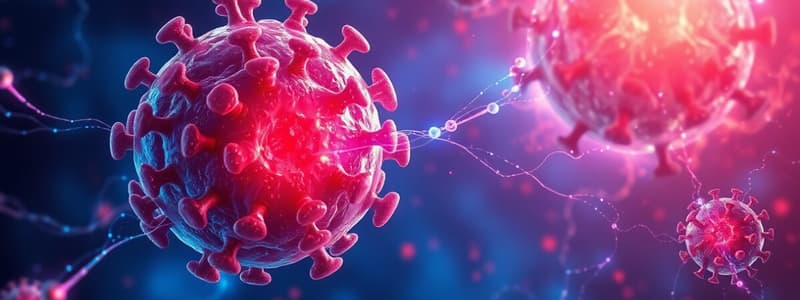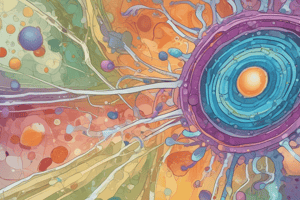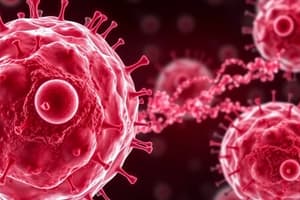Podcast
Questions and Answers
What type of hormones rely on intracellular receptor proteins to function?
What type of hormones rely on intracellular receptor proteins to function?
- Peptide hormones
- Eicosanoids
- Water-soluble hormones
- Steroid hormones (correct)
Where does the hormone-receptor complex bind to stimulate transcription?
Where does the hormone-receptor complex bind to stimulate transcription?
- Target gene in the nucleus (correct)
- Plasma membrane
- Cytoplasm
- Endoplasmic reticulum
What happens to mRNA after it is generated by the hormone-receptor complex?
What happens to mRNA after it is generated by the hormone-receptor complex?
- It breaks down immediately.
- It is translated into a specific protein. (correct)
- It circulates in the bloodstream.
- It is stored in the cytoplasm indefinitely.
Which of the following are examples of thyroid hormones?
Which of the following are examples of thyroid hormones?
In the cellular signaling process, where does the hormone first bind after passing through the plasma membrane?
In the cellular signaling process, where does the hormone first bind after passing through the plasma membrane?
What is the main role of B cells in the immune response?
What is the main role of B cells in the immune response?
Which type of signaling involves a cell responding to molecules it secretes itself?
Which type of signaling involves a cell responding to molecules it secretes itself?
What is the function of interleukin-1 (IL-1) in monocytes?
What is the function of interleukin-1 (IL-1) in monocytes?
What occurs after a T cell receptor recognizes a foreign antigen?
What occurs after a T cell receptor recognizes a foreign antigen?
What is the end result of B cell maturation?
What is the end result of B cell maturation?
Which type of signaling involves molecules acting on neighboring cells?
Which type of signaling involves molecules acting on neighboring cells?
What distinguishes synaptic signaling from other types?
What distinguishes synaptic signaling from other types?
Which cell type primarily performs phagocytosis?
Which cell type primarily performs phagocytosis?
What is crucial for a cell's ability to respond to signals?
What is crucial for a cell's ability to respond to signals?
How do extracellular signals affect a cell?
How do extracellular signals affect a cell?
What happens if a cell does not receive any signals?
What happens if a cell does not receive any signals?
What role does a receptor protein play in signaling?
What role does a receptor protein play in signaling?
What is a second messenger in the context of cellular signaling?
What is a second messenger in the context of cellular signaling?
How do signaling cascades function in a cell?
How do signaling cascades function in a cell?
What is a possible consequence of altering target proteins in a signaling pathway?
What is a possible consequence of altering target proteins in a signaling pathway?
What must happen for a signaling response to be produced in a cell?
What must happen for a signaling response to be produced in a cell?
What is the main role of most steroid receptors in cellular signaling?
What is the main role of most steroid receptors in cellular signaling?
How do extracellular signal molecules affect cell responses?
How do extracellular signal molecules affect cell responses?
Where are intracellular receptors typically located before a ligand binds?
Where are intracellular receptors typically located before a ligand binds?
Which type of signaling involves altered protein synthesis and changes in gene expression?
Which type of signaling involves altered protein synthesis and changes in gene expression?
What characteristic do all extracellular signal molecules share?
What characteristic do all extracellular signal molecules share?
What happens to intracellular receptors upon ligand binding?
What happens to intracellular receptors upon ligand binding?
Which of the following is true about hydrophobic signal molecules?
Which of the following is true about hydrophobic signal molecules?
What distinguishes the function of cytosolic receptors from nuclear receptors?
What distinguishes the function of cytosolic receptors from nuclear receptors?
What is one of the functional domains of a steroid receptor?
What is one of the functional domains of a steroid receptor?
What role does the DNA binding domain of a steroid receptor play?
What role does the DNA binding domain of a steroid receptor play?
What is a characteristic of the Steroid Receptor Superfamily?
What is a characteristic of the Steroid Receptor Superfamily?
What triggers smooth muscle relaxation in a blood-vessel wall?
What triggers smooth muscle relaxation in a blood-vessel wall?
How does nitric oxide signal within the target cell?
How does nitric oxide signal within the target cell?
What molecule does guanylyl cyclase catalyze the production of in response to nitric oxide?
What molecule does guanylyl cyclase catalyze the production of in response to nitric oxide?
What is the initial signal that leads to nitric oxide production in this signaling pathway?
What is the initial signal that leads to nitric oxide production in this signaling pathway?
What effect does cGMP have in smooth muscle cells following nitric oxide signaling?
What effect does cGMP have in smooth muscle cells following nitric oxide signaling?
Study Notes
Immune Response
- Macrophages engulf bacteria through phagocytosis.
- Macrophages present bacterial antigens to T lymphocytes.
- T lymphocytes activate and release cytokines.
- Cytokines signal B lymphocytes to mature.
- Mature B lymphocytes differentiate into plasma cells.
- Plasma cells secrete antibodies that bind to specific antigens.
### Cell Signaling
- Cells communicate through signaling molecules.
- Autocrine signaling: cells respond to signaling molecules they produce.
- Paracrine signaling: cells respond to signaling molecules produced by neighboring cells.
- Synapse signaling: cells communicate through neurotransmitters.
- Cell receptors are programmed to respond to specific signal molecules.
- Signal molecules activate a series of intracellular signaling proteins.
- Intracellular signaling pathways alter target proteins, changing cell behavior.
- Signals can trigger changes in protein function or gene expression.
### Types of Signals
- Signals molecules can be proteins, peptides, amino acids, nucleotides, steroids, fatty acid derivatives, and dissolved gases.
- Signal molecules bind to cell-surface receptors or intracellular receptors.
Intracellular Receptors
- Intracellular receptors are cytoplasmic or nuclear proteins.
- Signal molecules are lipid-soluble molecules.
- Steroid receptors have three functional domains: a hormone-binding domain, a DNA-binding domain, and a coactivator-binding domain.
- Steroid receptors bind to specific DNA sequences and regulate gene expression.
### Cell Signaling by Hydrophobic Signals
- Nitric oxide (NO) triggers smooth muscle relaxation in blood vessels.
- NO diffuses across cell membranes and binds to intracellular enzymes, affecting target enzymes.
- NO signaling causes blood vessels dilate.
### Steroid Hormones
- Steroid hormones bind to intracellular receptors, forming a hormone-receptor complex.
- The hormone-receptor complex translocates to the nucleus.
- The complex binds to specific DNA sequences and regulates gene expression.
Studying That Suits You
Use AI to generate personalized quizzes and flashcards to suit your learning preferences.
Related Documents
Description
Explore the mechanisms of the immune response and the various types of cell signaling in this quiz. Understand how macrophages, T lymphocytes, and B lymphocytes coordinate to defend the body, as well as how cells communicate through different signaling methods. Test your knowledge on the intricate processes involved in these biological interactions.




